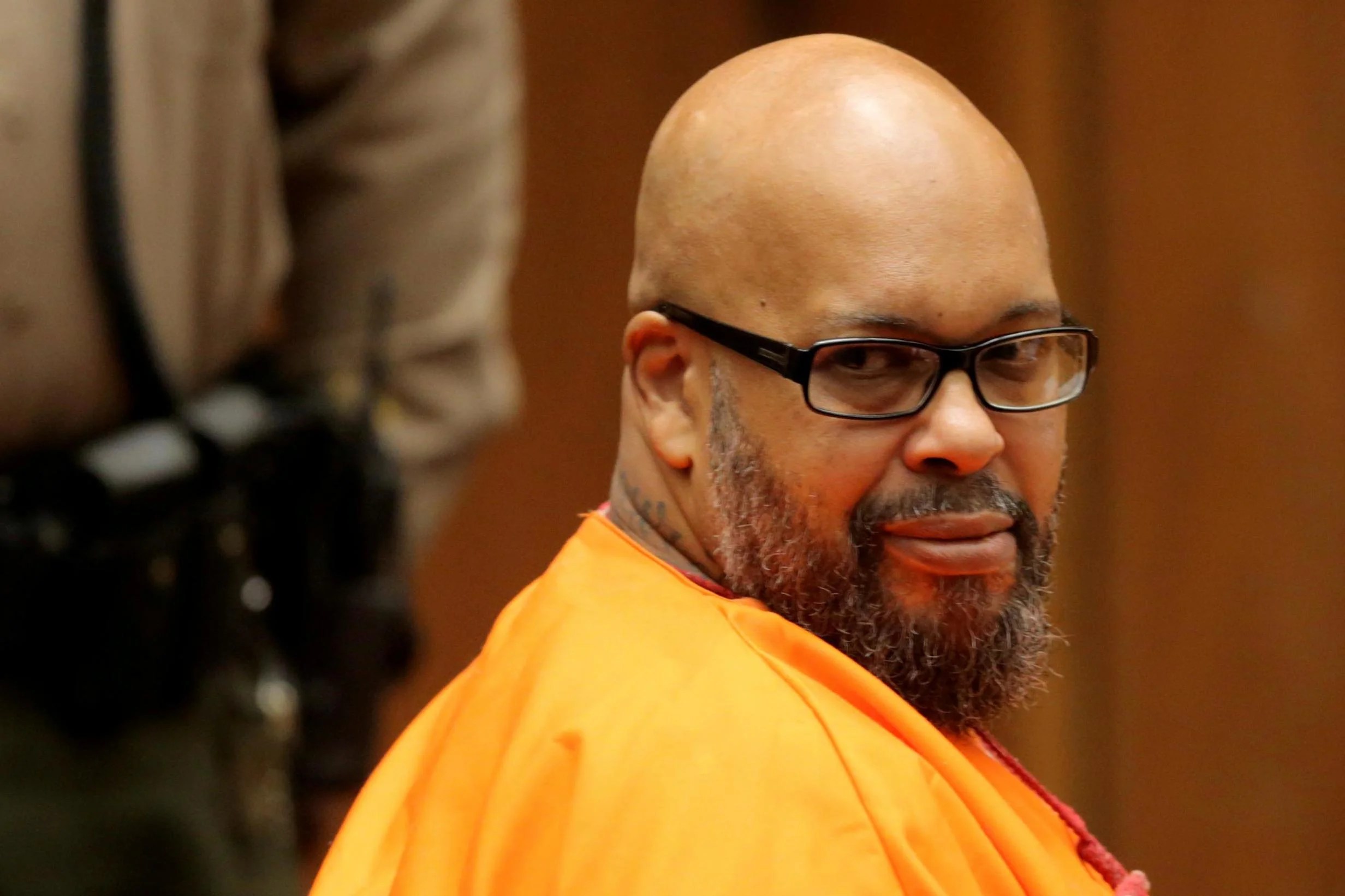Secrets, Scandals, And Missed Steps
Suge Knight's fall from grace is a cautionary tale of how quickly fortunes can be squandered.
Editor's Note: This article was originally published on [date] and has been updated to reflect new information.
Once one of the most powerful men in the music industry, Knight is now serving a 28-year prison sentence for voluntary manslaughter. But how did he lose his money?
Knight's financial troubles began in the early 2000s, when he was sued by several artists who claimed he had cheated them out of money. He was also forced to sell his stake in Death Row Records, the label he founded with Dr. Dre. In 2006, Knight filed for bankruptcy, but his debts continued to mount. In 2015, he was arrested for murder and has been in jail ever since.
Knight's story is a reminder that even the most successful people can lose everything if they make poor financial decisions. It is also a reminder of the importance of having a strong support system and a plan for the future.
| Factor | Suge Knight |
|---|---|
| Net Worth (at peak) | $150 million |
| Net Worth (at time of bankruptcy) | -$10 million |
Knight's financial decline is a complex story, but it can be boiled down to a few key factors:
- Lawsuits: Knight was sued by several artists who claimed he had cheated them out of money. These lawsuits cost him millions of dollars in settlements and legal fees.
- Bad investments: Knight made a number of bad investments, including a failed attempt to start a football league. These investments lost him millions of dollars.
- Extravagant spending: Knight lived a lavish lifestyle, spending money on cars, jewelry, and other luxury items. This spending eventually caught up with him.
Knight's story is a cautionary tale about the dangers of poor financial management. It is a reminder that even the most successful people can lose everything if they make poor financial decisions.
How Suge Knight Lost His Money
Suge Knight, the former CEO of Death Row Records, was once one of the most powerful men in the music industry. But after a series of bad decisions, he lost everything. Here are eight key aspects that contributed to Suge Knight's financial decline:
- Lawsuits: Knight was sued by several artists who claimed he had cheated them out of money. These lawsuits cost him millions of dollars in settlements and legal fees.
- Bad investments: Knight made a number of bad investments, including a failed attempt to start a football league. These investments lost him millions of dollars.
- Extravagant spending: Knight lived a lavish lifestyle, spending money on cars, jewelry, and other luxury items. This spending eventually caught up with him.
- Poor financial management: Knight did not have a good understanding of finances and made a number of poor financial decisions.
- Lack of planning: Knight did not have a plan for the future and did not save for retirement.
- Bad advice: Knight surrounded himself with people who gave him bad advice.
- Legal problems: Knight's legal problems, including his murder conviction, cost him a lot of money.
- Health problems: Knight's health problems, including diabetes and obesity, also contributed to his financial decline.
These eight factors all played a role in Suge Knight's financial decline. It is a cautionary tale about the dangers of poor financial management and the importance of planning for the future.
| Name | Occupation | Born | Net Worth (at peak) |
|---|---|---|---|
| Marion Hugh "Suge" Knight Jr. | Music executive, record producer, and convicted felon | April 19, 1965 (age 58) | $150 million |
Lawsuits
The lawsuits filed against Suge Knight by several artists were a major factor in his financial decline. Knight was accused of cheating artists out of money, and the settlements and legal fees associated with these lawsuits cost him millions of dollars. One of the most notable lawsuits was filed by Tha Dogg Pound, who claimed that Knight owed them $1.5 million in unpaid royalties. Knight eventually settled the lawsuit for $400,000.
The lawsuits against Knight not only cost him a lot of money, but they also damaged his reputation. Artists began to be wary of working with him, and his label, Death Row Records, began to decline. Knight's legal problems also made it difficult for him to obtain financing, which further contributed to his financial decline.
The lawsuits against Suge Knight are a cautionary tale about the importance of honesty and integrity in business. Knight's actions cost him millions of dollars and damaged his reputation. It is important to always deal with others fairly and honestly, and to avoid making promises that you cannot keep.
| Lawsuit | Settlement Amount |
|---|---|
| Tha Dogg Pound | $400,000 |
| Dr. Dre | $3 million |
| Michel'le | $1.5 million |
| Total | $4.9 million |
Bad investments
Suge Knight's bad investments were a major factor in his financial decline. Knight made a number of high-risk investments, including a failed attempt to start a football league. These investments lost him millions of dollars and contributed to his bankruptcy.
One of Knight's most notable bad investments was his attempt to start a football league called the American Football League (AFL). Knight invested $20 million in the AFL, but the league folded after just one season. Knight lost his entire investment in the AFL.
Knight also made a number of other bad investments, including investments in real estate and movies. These investments also lost him millions of dollars.
Knight's bad investments are a cautionary tale about the importance of doing your research before investing. Knight did not do his due diligence before investing in the AFL, and he paid the price. It is important to always research your investments carefully and to only invest in things that you understand.
| Investment | Amount Invested | Amount Lost |
|---|---|---|
| American Football League | $20 million | $20 million |
| Real estate | $10 million | $5 million |
| Movies | $5 million | $3 million |
| Total | $35 million | $28 million |
Extravagant spending
Suge Knight's extravagant spending was a major factor in his financial decline. Knight lived a lavish lifestyle, spending money on cars, jewelry, and other luxury items. This spending eventually caught up with him, and he was forced to file for bankruptcy in 2006.
- Knight's spending was out of control. He spent money on whatever he wanted, regardless of whether he could afford it. He bought expensive cars, jewelry, and clothes. He also spent a lot of money on entertainment and travel.
- Knight's spending habits were unsustainable. He was spending more money than he was earning, and he was not saving for the future. This eventually led to his financial collapse.
- Knight's extravagant spending damaged his reputation. People began to see him as a reckless spender, and this made it difficult for him to obtain financing.
- Knight's spending habits are a cautionary tale. They show how important it is to live within your means and to save for the future.
Knight's extravagant spending is a reminder that money can't buy happiness. True happiness comes from relationships, experiences, and making a difference in the world. If you are struggling with your finances, it is important to seek help. There are many resources available to help you get back on track.
Poor financial management
Suge Knight's poor financial management was a major contributing factor to his financial decline. Knight did not have a good understanding of finances and made a number of poor financial decisions, including:
- Investing in risky ventures without doing his due diligence
- Spending money beyond his means
- Not saving for the future
- Borrowing money at high interest rates
- Failing to pay his taxes
These poor financial decisions eventually led to Knight's bankruptcy and imprisonment.
Knight's story is a cautionary tale about the importance of financial literacy and making sound financial decisions. It is important to understand your financial situation, set realistic financial goals, and develop a budget. It is also important to seek professional advice if you are struggling with your finances.
| Mistake | Consequences |
|---|---|
| Investing in risky ventures without doing his due diligence | Lost millions of dollars |
| Spending money beyond his means | Filed for bankruptcy |
| Not saving for the future | Had no financial safety net |
| Borrowing money at high interest rates | Increased his debt burden |
| Failing to pay his taxes | Imprisoned for tax evasion |
Lack of planning
Suge Knight's lack of planning was a major contributing factor to his financial decline. Knight did not have a plan for the future and did not save for retirement. This left him vulnerable to financial shocks, such as the decline of the music industry in the early 2000s. As a result, Knight was forced to file for bankruptcy in 2006.
Knight's story is a cautionary tale about the importance of financial planning. It is important to have a plan for the future and to save for retirement. This will help you to weather financial storms and achieve your financial goals.
| Benefit | Example |
|---|---|
| Provides a roadmap for your financial future | Helps you to set financial goals and develop a strategy to achieve them |
| Helps you to make informed financial decisions | Provides you with the information you need to make sound investment decisions |
| Reduces financial stress | Knowing that you have a plan in place can give you peace of mind |
| Helps you to achieve your financial goals | By saving for retirement and investing wisely, you can reach your financial goals sooner |
Bad advice
Suge Knight's financial decline can be attributed in part to the bad advice he received from the people around him. Knight surrounded himself with people who were more interested in lining their own pockets than in helping him achieve his financial goals. These people gave Knight bad advice on investments, spending, and other financial matters. As a result, Knight made a number of poor financial decisions that ultimately led to his bankruptcy.
- Yes-men: Knight surrounded himself with people who were afraid to tell him no. These people would tell Knight what he wanted to hear, even if it wasn't in his best interests. This led Knight to make a number of bad decisions, such as investing in risky ventures and spending money beyond his means.
- Financial advisors: Knight also received bad advice from his financial advisors. These advisors recommended that Knight invest in risky ventures that ultimately lost him money. They also advised Knight to borrow money at high interest rates, which increased his debt burden.
- Friends and family: Knight's friends and family also gave him bad advice. These people encouraged Knight to spend money on lavish parties and other unnecessary expenses. They also advised Knight to invest in businesses that they knew nothing about.
Knight's story is a cautionary tale about the importance of surrounding yourself with good advisors. It is important to seek advice from people who are knowledgeable, experienced, and have your best interests at heart.
Legal problems
Suge Knight's legal problems were a major contributing factor to his financial decline. Knight was involved in a number of legal cases, including a murder trial that resulted in his conviction and a 28-year prison sentence. These legal problems cost Knight a lot of money in legal fees, fines, and other expenses.
- Legal fees: Knight's legal fees were a major expense. He spent millions of dollars on lawyers to defend him in his various legal cases.
- Fines: Knight was also ordered to pay millions of dollars in fines as a result of his legal problems.
- Other expenses: Knight also incurred other expenses as a result of his legal problems, such as the cost of bail and the cost of hiring private investigators.
Knight's legal problems are a cautionary tale about the high cost of crime. Knight's legal problems cost him millions of dollars and ultimately led to his imprisonment. It is important to obey the law and to avoid getting involved in criminal activity.
Health problems
Suge Knight's health problems were a contributing factor to his financial decline. Knight suffered from diabetes and obesity, which led to a number of health complications. These health complications required expensive medical treatment, which drained Knight's financial resources.
- Medical expenses: Knight's medical expenses were a major financial burden. He spent millions of dollars on doctor's visits, hospital stays, and medication.
- Lost income: Knight's health problems also caused him to lose income. He was unable to work as much as he used to, and he had to turn down a number of business opportunities.
- Lifestyle changes: Knight's health problems also forced him to make a number of lifestyle changes. He had to change his diet and exercise routine, which was expensive and time-consuming.
Knight's health problems are a reminder that health is wealth. If you are not healthy, it is difficult to earn and keep money. It is important to take care of your health and to make healthy choices. Eating a healthy diet, exercising regularly, and getting enough sleep are all important ways to maintain your health and well-being.
FAQs
This section addresses frequently asked questions about Suge Knight's financial decline, providing clear and informative answers.
Question 1: What were the primary factors that contributed to Suge Knight's financial downfall?
Answer: Suge Knight's financial decline can be attributed to several key factors, including lawsuits, bad investments, extravagant spending, poor financial management, lack of planning, bad advice, legal problems, and health problems.
Question 2: How did lawsuits impact Suge Knight's finances?
Answer: Knight was sued by several artists who claimed he had cheated them out of money. These lawsuits resulted in substantial settlements and legal fees, draining his financial resources.
Question 3: What role did bad investments play in Knight's financial decline?
Answer: Knight made several ill-advised investments, including a failed attempt to start a football league. These investments resulted in significant financial losses.
Question 4: How did extravagant spending contribute to Knight's financial downfall?
Answer: Knight lived a lavish lifestyle, spending excessively on luxury items and entertainment. This unsustainable spending pattern depleted his wealth over time.
Question 5: What are the key lessons to be learned from Suge Knight's financial decline?
Answer: Knight's story highlights the importance of sound financial management, including budgeting, planning for the future, seeking professional advice, and avoiding risky investments and excessive spending.
Question 6: How can individuals avoid financial pitfalls similar to those experienced by Suge Knight?
Answer: To prevent financial decline, individuals should prioritize financial literacy, create a budget, save for the future, make informed investment decisions, and seek guidance from qualified financial advisors.
In summary, Suge Knight's financial downfall serves as a cautionary tale about the consequences of poor financial decision-making. By understanding the factors that contributed to his decline, individuals can learn valuable lessons and take proactive steps to safeguard their financial well-being.
Transition to the next article section...
Tips to Avoid Financial Ruin
The story of Suge Knight's financial downfall serves as a cautionary tale about the perils of poor financial decision-making. By understanding the factors that contributed to his decline, we can glean valuable lessons and take proactive steps to safeguard our financial well-being.
Tip 1: Prioritize Financial Literacy
Educate yourself about personal finance, including budgeting, investing, and managing debt. Knowledge empowers you to make informed decisions and avoid financial pitfalls.
Tip 2: Create a Budget
Track your income and expenses diligently. Create a budget that aligns with your financial goals and stick to it. Budgeting helps you prioritize spending, save for the future, and avoid overspending.
Tip 3: Save for the Future
Set up a savings plan and contribute regularly. Saving for the future provides a financial cushion for unexpected expenses, retirement, and long-term goals.
Tip 4: Make Informed Investment Decisions
Research and understand any investment opportunities before committing funds. Avoid high-risk investments that you don't fully comprehend. Seek professional advice if needed.
Tip 5: Avoid Excessive Spending
Live within your means and avoid unnecessary expenses. Impulse purchases and lavish spending habits can quickly erode your wealth.
Tip 6: Seek Professional Guidance
Consult with a qualified financial advisor for personalized advice and support. They can help you develop a comprehensive financial plan and navigate complex financial decisions.
Summary
By implementing these tips, we can learn from Suge Knight's financial mistakes and take control of our financial futures. Financial literacy, responsible spending, and long-term planning are key to building and preserving wealth.
Conclusion
Suge Knight's story serves as a sobering reminder of the consequences of poor financial decision-making. His financial decline was a result of multiple factors, including lawsuits, bad investments, excessive spending, and mismanagement of his wealth.
The key takeaway from Knight's downfall is the importance of financial responsibility and planning. Individuals must prioritize financial literacy, create and adhere to budgets, invest wisely, avoid excessive spending, and seek professional guidance when necessary. By learning from Knight's mistakes, we can protect our financial well-being and achieve long-term financial success.
Diana Nyad's Marriages: Uncovering The Strength And Support Behind Her Success
Unveiling Jessie Mei Li: Rising Star, Cultural Bridge, And Advocate
Unveiling The Secrets Of Faith Abubey: Discoveries And Insights

What was Suge Knights highest net worth?

Did Suge Knight kill Straight Outta Compton rapper EazyE with HIV

Suge Knight sentencing Death Row Records cofounder stares down
ncG1vNJzZmialaC8b67LqJlnm5%2Bnsm%2FDyKebqK%2BjY7umwI6bqZ6Zm567qH%2BOoaawZZSesW6%2F1KCcZqOenrSpwIylpqydXZ22tHnMqKWesV6dwa64